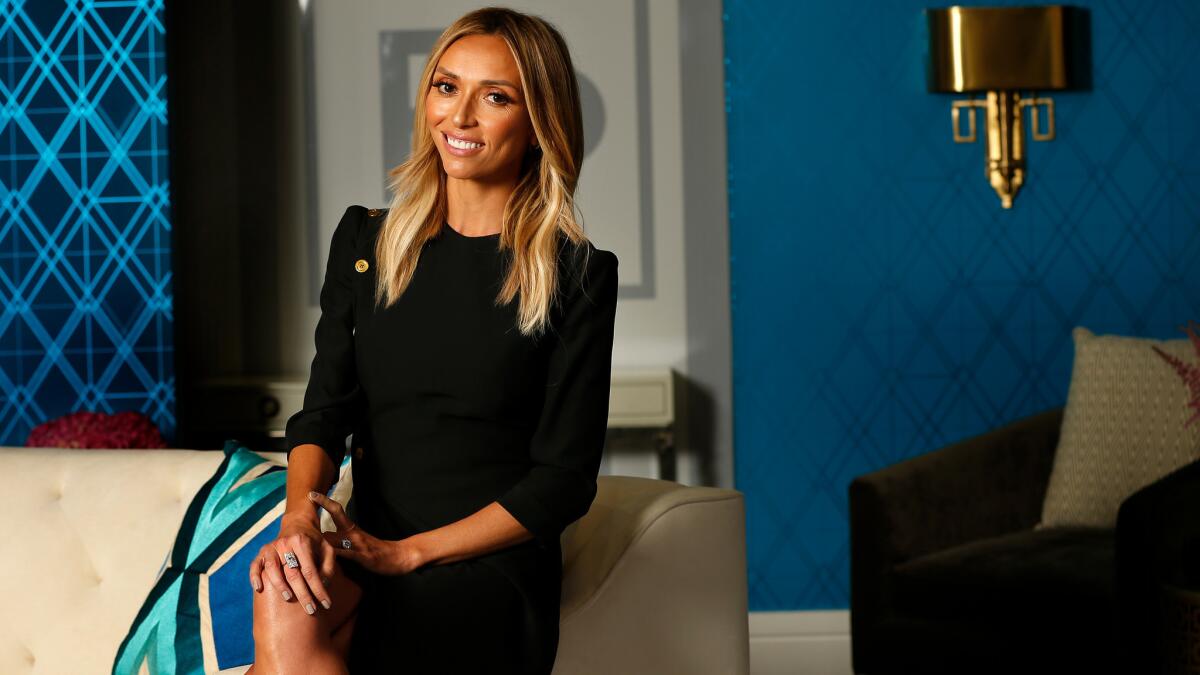How Giuliana Rancic moved past being ‘just someone with breast cancer’

One thing became apparent to Giuliana Rancic as she worked to stress the importance of early detection in breast cancer: Women dealing with it wanted nothing more than to treat their friends to dinner. Or to treat their family to a much-needed vacation. Or to stop thinking about chemotherapy and drugs for a day, and head to a spa instead.
So the TV personality, who went public with her breast cancer diagnosis and subsequent double mastectomy five years ago, set up a foundation in 2012 called Fab-U-Wish, whose goal is to grant wishes to women who have breast cancer. And the wishes rarely have anything to do with their condition.
“When you’re diagnosed, you don’t care about hair and makeup and clothes and all the little things in life,” Rancic said. “I realized, ‘I’m not just someone with breast cancer. I’m still the girl I was before.’ I wanted to find a way to give women the opportunity to feel fabulous for a day.’”
Last month, Rancic teamed up with another breast cancer charity, the Pink Agenda, and car brand Volkswagen to auction off a limited-edition 2017 pink VW Beetle. The winner (it went for just over $30,000) will be flown to New York to attend a Pink Agenda event next week, and spend time with Rancic.
The co-host of “E!’s Live From the Red Carpet” and “Fashion Police” shows, who also has her own fashion line through Home Shopping Network and a new memoir, talks about how not to “catastrophize,” the importance of a support system and the double-edged sword that is living through an illness in the spotlight.
Your biggest message is prevention and early detection. But a lot of women think, “This won’t happen to me.” What do you say to them?
I was 36 when I was diagnosed. There was no history in my family (of cancer). The only reason I was getting a mammogram, and the only reason I found the cancer, was because I was going through in-vitro fertilization, and my doctor said every patient had to have one. It ended up being a blessing in disguise. We found it early enough that we could take the cancer out of my body. That’s the key. If you find it early enough, there is a 98% survival rate. Women say, “I’m not 40 yet.” But it’s never too early to start, even through self exams, and getting to know your body.
How did your experience fuel your desire to help other women cope with the condition?
I remember, after the double mastectomy, going back to work and being at E!, getting ready to go on set. I looked in the mirror, and for the first time in months I recognized that face. I was still the girl I was before. When I saw that, it helped me in terms of moving on. That’s when I wanted to start granting wishes to other women through Fab-U-Wish.
What do you find women ask for the most?
A lot of the wishes are selfless. They aren’t even directly for the women, but as a way to say “thank you” to those who have been by their side. One woman asked that we help her host a dinner for 10 friends at a restaurant. Others want to take their families on vacation or to have a fun makeover day with friends. But we also always find a way to surprise the woman with something that’s just for her. One woman really wanted to go see Jennifer Lopez perform in Las Vegas, and we helped her do that. She was able to meet Jennifer as well. We get the best feedback, notes that say, “I forgot what it felt like to have fun.”
Apart from early detection, what other valuable advice would you share with women?
If you’re able to, have people in your life who can play the part of caregiver, who can be that support system. It’s critical. I would catastrophize everything. I was in such a highly emotional state. But my husband (entrepreneur, motivational speaker and author Bill Rancic) was the one who would bring me back to earth. He would grab what we call his “99-cent solution” -- his yellow legal pad -- ask me to take a deep breath, put my feet back on the ground, and he’d say, “Before you get upset, let’s make a list of pros and cons. Let’s look at solutions.” It would calm me down.
You lived through life-transforming events -- cancer, infertility -- in the limelight. Public reaction wasn’t always positive. How did you deal with that?
Actually, it was very difficult to talk about it publicly. But I also wanted to be in control of my story. As I was walking in and out of doctors’ offices in Los Angeles, I knew it would be easy for that story to get told by someone else. For me, it was about being able to tell the real story. If I had to do it all over again, I would do it the same way. Not a day goes by when I don’t hear something rewarding from someone just because I shared my story. I’m just a positive person by nature. I know what truly matters in life.
READ ON!
Why this magazine is ditching the ‘body shaming’ language
Caring for cuts, burns and scrapes: The rules have changed
4 L.A.-area running clubs that are way more than just running clubs






